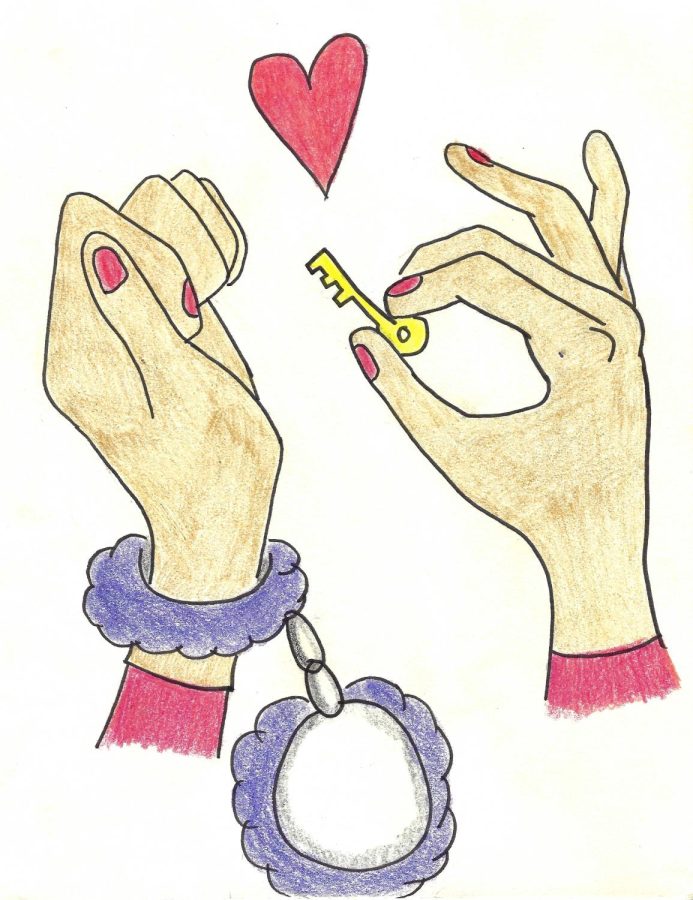Consent, communication and sense of community — K.I.N.K. Kent State relationship ground rules
Rope, leather, swings, leashes, collars, daddies, handcuffs and toys.
For many, this list may seem random. But for some, this list represents the most intimate moments in the bedroom.
“One of the things I am really into is pet playing, which is about roleplaying the dynamic of a pet. So like, leashes, being fed out a bowl, those kind of things,” said Lauren Smith, a K.I.N.K. Kent State board member.
K.I.N.K. Kent State fosters strong relationships with the promotion of consent, communication and a sense of community.
Although there might be the surface level of sexual kinks, there are deeper ground rules for this subculture and its relationships.
“It’s about communication and consent,” said Miranda Maurer, a K.I.N.K. board member. Paloma Wrisley, another board member, said it’s also about relationships and trust exercises.
With similarities the majority of the population does not understand, a strong sense of community exists within the kink world.
“They say that finding your community helps your soul. You can see that you are not weird, that you are not as much of a black sheep as you think you are,” Ace, a K.I.N.K. Kent State member from the community who declined to provide zheir last name, said.
Wrisley and Ace find comfort in being surrounded by like-minded people, they said.
“There is a lot of stigma about kink and being open about sexual preferences and that kinda thing. And, I can understand where that comes from, a lot of people don’t believe it has a place in academia,” Wrisley said. “Kent and other colleges are not just a place to learn and get a degree, it is also a place to find yourself and your people and I think K.I.N.K. really helps.”
This sense of community helps its members feel comfortable with their identities.
“You can discuss with people about the things you are into and you gain that (feeling of), ‘I’m not a weirdo; other people are into this too,’” Smith said.
Not only does the strong community create strong relationships, but communication is also key.
“Even if you’re a ‘vanilla’ person, I think communication needs to be more of a focus if you are doing anything sexual,” Maurer said.
Maurer said. “Communication is important for every relationship, whether or not it’s romantic. You’re never going to know what your partner likes and what they don’t unless you talk about it.”
Urban Dictionary defines “vanilla” as a distinct lack of kink, blandness or a reference to the “norm.”
Recognizing some people face issues with communication, Maurer said even though the conversations can be difficult, she believes the best experiences happen when people take the time to communicate what they want and how they want it.
“Trying to find someone who is wanting the same things you … they have misconstrued ideas of BDSM or they are just terrified of it, so if I say ‘hey, I’m kinda into bondage, dominance, sadism and masochism (BDSM),’ they are like, ‘ahhhh you sure about that?,’” said Brittany Boord, K.I.N.K president.
Once communication comes into play, the next relationship step is consent.
“It doesn’t matter what you are into as long as both people consent and are being safe about it,” said Maurer.
Consent is one of the most important things in a relationship, said Smith, and because the kinks can take sexual relations to another level, all people involved in kink sex must be consensual and respect safe words.
Not only does Smith recognize the importance of consent in sexual relations, Ace also agrees.
“Just because someone is old enough to consent doesn’t mean they can consent to BDSM,” Ace said.
“Because of ‘50 Shades (of Grey)’, people tend to get a misrepresentation of kink from that because it is a horrible representation. That relationship is very much not consensual,” Smith said.
Unfortunately, a lot of stigma surrounds the K.I.N.K. Kent State organization, members said.
“A lot of people when they first hear about us think we’re a joke, like ‘oh K.I.N.K. Kent State that’s funny haha’ or they think we have orgies on the weekdays, and that’s not what we are,” Boord said. “We are PG-13 because we are sponsored by the school. People think we are tying people down on the tables and doing other stuff like that but we don’t. We have PowerPoints and discuss our experiences (and) ask questions.”
Even with all the stigma, some members want to remind people that they are just like everyone else.
“We are not as scary and hardcore as we seem,” Boord said. “Most of us are just soft people who want to make friends and want to explore and learn about this part of life that no one talks about but are into.”
Kody Elsayed covers relationships. Contact him at [email protected].



